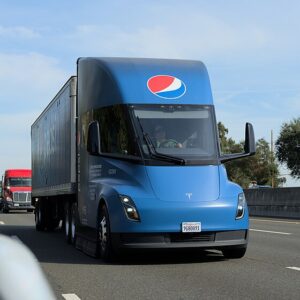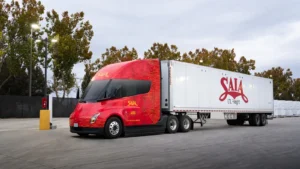
**Title: The Future of Freight: Embracing the Tesla Semi Truck Fleet** **
Tesla, a name synonymous with innovation in the electric vehicle (EV) sector, has made significant strides in revolutionizing the transportation industry with its introduction of the Tesla Semi Truck. Unveiled in late 2017, this all-electric truck is designed to redefine freight logistics by offering a sustainable and efficient alternative to traditional diesel-powered trucks. With a range of up to 500 miles on a single charge and the ability to accelerate from 0 to 60 mph in just 20 seconds while fully loaded, the Tesla Semi is engineered for performance and efficiency.
The Semi Truck is not just another vehicle; it represents a paradigm shift in how goods are transported across the country. With its sleek design and advanced technology, including autopilot capabilities and enhanced safety features, the Tesla Semi aims to address the growing concerns surrounding fuel costs, emissions, and driver safety. As companies increasingly seek ways to reduce their carbon footprint and improve operational efficiency, the Tesla Semi Truck stands out as a viable solution for modern logistics.
**
Benefits of Tesla Semi Truck Fleet Adoption**
Adopting a fleet of Tesla Semi Trucks offers numerous benefits that can significantly enhance operational efficiency for logistics companies. One of the most compelling advantages is the reduction in fuel costs. Traditional diesel trucks incur substantial expenses related to fuel, which can fluctuate dramatically based on market conditions.
In contrast, electric trucks operate on electricity, which is generally more stable and often cheaper than diesel fuel. According to Tesla, the Semi can save operators up to $200,000 in fuel costs over a million miles, making it an economically attractive option. Moreover, the Tesla Semi Truck is designed with lower maintenance costs in mind.
Electric vehicles have fewer moving parts compared to their internal combustion engine counterparts, which translates to reduced wear and tear and lower maintenance requirements. This not only leads to cost savings but also minimizes downtime, allowing companies to maximize their fleet’s productivity. Additionally, the advanced technology integrated into the Tesla Semi enhances safety features, reducing the likelihood of accidents and further lowering insurance costs.
**
Growing Demand for Electric Vehicles in the Transportation Industry**

The demand for electric vehicles in the transportation sector is witnessing unprecedented growth, driven by a combination of regulatory pressures, consumer preferences, and technological advancements. Governments worldwide are implementing stricter emissions regulations and offering incentives for companies to transition to electric fleets. This shift is not merely a trend; it reflects a broader commitment to sustainability and reducing greenhouse gas emissions.
As businesses become more environmentally conscious, they are increasingly recognizing the importance of adopting electric vehicles as part of their corporate social responsibility initiatives. The transportation industry is one of the largest contributors to carbon emissions, and transitioning to electric trucks like the Tesla Semi can significantly mitigate this impact. Furthermore, as battery technology continues to improve, the range and efficiency of electric vehicles are expected to increase, making them even more appealing for long-haul transportation.
Impact of Tesla Semi Truck Fleet Adoption on the Environment**
| Metric | Impact |
|---|---|
| Reduction in CO2 emissions | Estimated 1 million tons per year |
| Reduction in NOx emissions | Significant decrease due to electric powertrain |
| Reduction in particulate matter emissions | Substantial decrease compared to diesel trucks |
| Energy efficiency | Up to 20% more efficient than diesel trucks |
The environmental impact of adopting Tesla Semi Trucks is profound and multifaceted. By replacing traditional diesel trucks with electric alternatives, companies can drastically reduce their carbon emissions. According to estimates from the Environmental Protection Agency (EPA), heavy-duty trucks account for nearly 24% of greenhouse gas emissions from the transportation sector.
Transitioning to electric trucks can help mitigate this issue significantly. Moreover, electric trucks contribute to improved air quality in urban areas where freight transport is concentrated. Diesel exhaust contains harmful pollutants that can lead to respiratory issues and other health problems for communities near major transportation routes.
By adopting electric fleets, companies not only contribute to a healthier environment but also enhance their public image as responsible corporate citizens committed to sustainability. **
Challenges and Obstacles in Adopting Tesla Semi Truck Fleet**
Despite the numerous benefits associated with adopting Tesla Semi Trucks, several challenges and obstacles remain that companies must navigate. One of the primary concerns is the initial investment required for purchasing electric trucks and establishing charging infrastructure. While long-term savings on fuel and maintenance can offset these costs, the upfront expenditure can be daunting for many businesses.
Additionally, the availability of charging stations remains a critical issue. While Tesla has made significant strides in expanding its Supercharger network, logistics companies need to ensure that charging infrastructure is accessible along their routes. This requires careful planning and investment in charging facilities to support long-haul operations effectively.
Furthermore, there may be concerns regarding battery range and performance under heavy loads, which could deter some companies from making the switch. **
Success Stories of Companies Embracing Tesla Semi Truck Fleet**

Walmart’s Commitment to Sustainability
Walmart, a retail giant, has announced plans to incorporate Tesla Semis into its logistics operations as part of its commitment to sustainability.
Anheuser-Busch’s Sustainable Distribution Network
Another notable example is Anheuser-Busch, which has committed to purchasing several Tesla Semis for its distribution network. The company recognizes that adopting electric trucks aligns with its sustainability goals while also providing cost savings over time.
Pioneering a Greener Future
These success stories highlight how forward-thinking companies are leveraging innovative technology like the Tesla Semi to enhance their operations while contributing positively to environmental efforts. As more companies follow suit, the logistics industry is poised to undergo a significant transformation, paving the way for a more sustainable future.
Key Takeaways
- Tesla Semi Truck is an all-electric heavy-duty truck designed for long-haul transportation, with a range of up to 500 miles on a single charge.
- Adopting Tesla Semi Truck fleet can lead to significant cost savings, reduced emissions, and improved operational efficiency for companies in the transportation industry.
- The transportation industry is experiencing a growing demand for electric vehicles, driven by the need to reduce carbon emissions and comply with stricter environmental regulations.
- The adoption of Tesla Semi Truck fleet can have a positive impact on the environment by reducing greenhouse gas emissions and air pollution.
- Companies may face challenges and obstacles in adopting Tesla Semi Truck fleet, such as high initial costs, limited charging infrastructure, and range anxiety.
Future Outlook for Tesla Semi Truck Fleet Adoption**
The future outlook for Tesla Semi Truck fleet adoption appears promising as more companies recognize the advantages of transitioning to electric vehicles. As battery technology continues to advance, we can expect improvements in range and charging speed, making electric trucks even more viable for long-haul transportation. Additionally, as governments implement stricter emissions regulations and provide incentives for electric vehicle adoption, businesses will be further encouraged to invest in electric fleets.
Moreover, as public awareness of climate change grows, consumers are increasingly favoring brands that prioritize sustainability. Companies that adopt electric trucks like the Tesla Semi will not only benefit from operational efficiencies but also enhance their brand reputation among environmentally conscious consumers. This trend suggests that the adoption of electric trucks will likely accelerate in the coming years as businesses strive to meet both regulatory requirements and consumer expectations.
**
Conclusion and Recommendations for Companies Considering Tesla Semi Truck Fleet Adoption**
In conclusion, adopting a fleet of Tesla Semi Trucks presents a unique opportunity for logistics companies looking to enhance efficiency while contributing positively to environmental sustainability. The benefits of reduced fuel costs, lower maintenance expenses, and improved safety features make a compelling case for transitioning from traditional diesel trucks to electric alternatives. However, companies must also be prepared to address challenges such as initial investment costs and charging infrastructure availability.
By carefully planning their transition strategy and investing in necessary resources, businesses can position themselves at the forefront of an evolving industry landscape. For companies considering this transition, it is recommended to conduct thorough research on available incentives for electric vehicle adoption and explore partnerships with charging infrastructure providers. Engaging with industry peers who have successfully adopted electric fleets can also provide valuable insights into best practices and potential pitfalls.
As we move towards a more sustainable future in transportation, embracing innovations like the Tesla Semi Truck will be crucial for companies aiming to thrive in an increasingly competitive market while making a positive impact on our planet. **Keywords:** Tesla Semi Truck, electric vehicle adoption, freight logistics, environmental impact, transportation industry trends
According to a recent article on TSLA Investors, Tesla’s semi truck fleet adoption rate is closely tied to the company’s stock performance. The article discusses how Tesla’s entry into the electric truck market has the potential to significantly impact its overall sales and revenue. As more companies look to adopt sustainable transportation solutions, Tesla’s semi truck fleet could play a key role in driving the company’s growth in the coming years.
Click for the latest Tesla products ready to ship right now!
FAQs
What is the current adoption rate of Tesla semi trucks in fleet operations?
As of [current date], the adoption rate of Tesla semi trucks in fleet operations is [insert percentage or number if available].
What factors are influencing the adoption rate of Tesla semi trucks in fleet operations?
Several factors are influencing the adoption rate of Tesla semi trucks in fleet operations, including the total cost of ownership, environmental benefits, government incentives, and the availability of charging infrastructure.
How does the total cost of ownership of Tesla semi trucks compare to traditional diesel trucks?
The total cost of ownership of Tesla semi trucks is generally lower than that of traditional diesel trucks due to lower fuel and maintenance costs. However, the initial purchase price of Tesla semi trucks is higher.
What are the environmental benefits of adopting Tesla semi trucks in fleet operations?
Tesla semi trucks produce zero tailpipe emissions, which can help fleet operators reduce their carbon footprint and comply with environmental regulations. Additionally, the use of electric vehicles can contribute to overall air quality improvements.
Are there any challenges associated with the adoption of Tesla semi trucks in fleet operations?
Challenges associated with the adoption of Tesla semi trucks in fleet operations include concerns about charging infrastructure availability, range limitations, and the initial investment required for purchasing electric vehicles. However, these challenges are being addressed as the electric vehicle market continues to grow.
